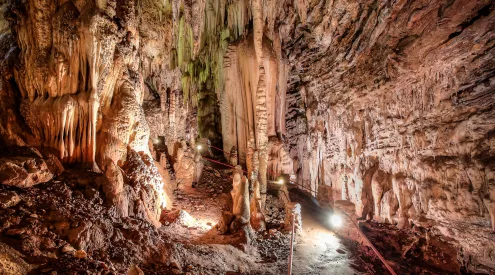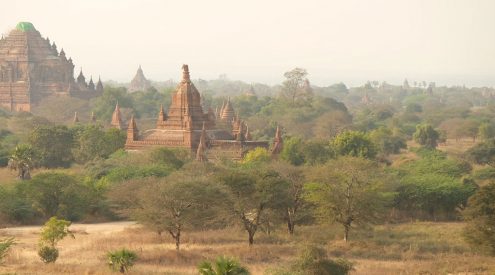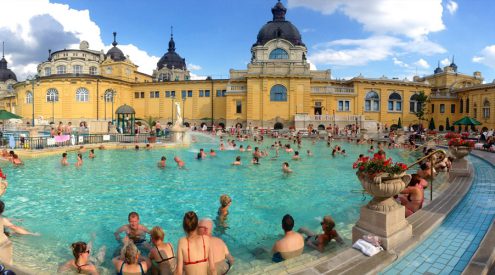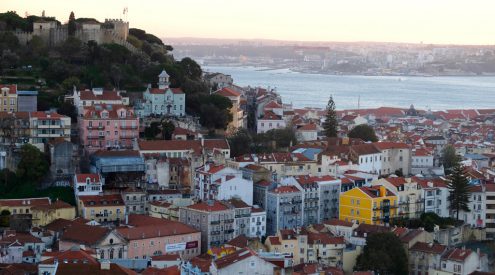Villandraut
Villandraut is a tiny village where the population hovers around 940 and life travels as slowly as the Gascogne River that meanders through it. It was a big change from bustling Bordeaux and just what we need. All of the buildings in Villandraut are typical of the French countryside; all stone with with earthy-coloured tiled roofs. The houses flank a dilapidated, but still beautiful old castle, the Castle of Villandraut, which was the home of Pope Clement V in the 1300s.
Unfortunately we didn’t stay long in Villandraut, but we did manage to hire a canoe and paddle down the river. The stillness of the cool water, flanked by rows and rows of trees, combined with and the absolute silence almost lulled us to sleep. I think the best part of it, though, was the fact that there was not a tourist in sight (why is it, as a tourist, that you don’t want to see other tourists?), only friendly farmers and their children waving to you from the banks.
After three hours of canoeing, we ate at a gourmet restaurant, Le Pont Gourmand,overlooking the river. The food was spectacular, beautifully presented and not too fussy; a surprising find in such a small town.
The next day we decided to wander around town before heading off to Agen. This exercise proved fruitless as everything was closed. This was to be one example of the frustrations we have with France; their infamous 28-hour work week. Shops here normally open at 10h00, break for lunch from 12h30 to 15h30 and then close at around 17h30 and don’t open at all over the weekend and some random days (usually Mondays or Wednesdays) and if they are by chance open on a Monday, it’s usually from 15h00 to 17h30.
Agen
So on it was to Agen, then. We arrived late and only stayed for one night, but Agen is an industrial city – a big change from slow Villandraut. The nice receptionist at our aparthotel encourages us to walk into town as it’s only about a 15 to 20 minute walk. We were ravenous, so we set off immediately. It turns out that the centre of Agen was more like a 45-minute walk on a freeway in blistering heat and by the time we get to the city, everything is either full or closed. So we settled on buying a stale baguette and some sausages and began the long trek back to our quarters.
We didn’t like Agen. Though we probably didn’t give it much of a chance and I’m certain it has much to offer, however we will not be going to Agen … again.
Toulouse
So we were glad to be making our way to Toulouse early the next morning. We drove past countless fields of sunflowers, vineyards and ploughed hay; just blurs of yellow, green and gold. (Made me think of home!)
By chance we stopped for lunch in Moissac, a small town on the Canal de Garonne. It is steeped in history dating back to Roman times, with an abbey and the most awe-inspiring church I’ve ever been to. It’s not that the church is grand with detailed religious paintings and stained glass windows, in fact it’s pretty simple inside; the walls are painted with rudimentary little flowers and the décor is somewhat plain. It’s just the feeling that it evokes that is overwhelming – I’ve never been as moved by a place of worship. Its ancient origins can be felt, aside from the fact that we were some of the only people there, so we were able to sit in silence and appreciate it. It’s no wonder that the Saint-Pierre abbey church and cloister are listed among the World Heritage Sites of the routes of Santiago de Compostela.
We climbed reluctantly back into our car, heading for Toulouse which is only another 45 minutes away. As it turns out, Toulouse is a bustling city filled with students. It’s kind of like Stellenbosch, but with cobbled roads flanked by romantic terraced houses. I liked Toulouse, it’s young and vibey, but still steeped in history. The grocery stores are filled with youths stocking up on fresh fruit, gourmet cheeses and veggies- very different from the trolleys filled with two minute noodles and Ouma rusks back home.
Our stay in Toulouse was short and we spent most of it at the Victor Hugo market – a mecca of hams and fish and cheeses and, of course, Toulouse sausages; the city’s famous big, herby, fatty, tasty sausages frequently used in Cassoulets (bean stew made with confit of duck and other meat – a source of national pride in this region of France). Afterwards we ate at one of the five cheap and satisfying restaurants upstairs from the market, where we were smiled at and chatted to by the locals. We haven’t met one surly Frenchman in France to date; I’m not entirely sure why they have such a stereotypically bad rep.


















